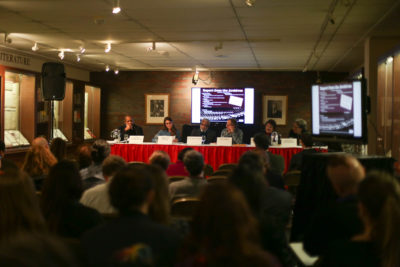
A panel of speakers from a variety academic backgrounds came together Tuesday evening for a roundtable discussion about Boston University’s Mugar Memorial Library archives and the roles that archives have played in their work.
The discussion, titled “Boston University Archives Round Table” served as a follow-up event to the BU Center for the Humanities’ “Recording Lives: Libraries and Archives in the Digital Age” event held in October, according to English professor Susan Mizruchi.
Mizruchi, who serves as the director of the BU Center for the Humanities, said in a phone interview before the roundtable that when she became director, she wanted to introduce an event series that enhanced the reputation of the center locally, nationally and globally.
The primary goal of the discussion was to create publicity and inform the BU community about the archival resources available on campus.
“The leading goal is to get people excited about the archives that we have,” Mizruchi said. “[The archives] have the potential to serve people from many different areas with many different interests.”
The panel was composed of BU faculty, professors and a graduate student, as well as Julieanna Richardson, the founder and executive director of The HistoryMakers, an African-American video oral history collection.
Professor of ethical leadership Walter Fluker, a panelist who himself has utilized BU’s archives, said during a phone interview before the roundtable that archives are an integral component to educational research.
“Scholars are on a hunt — a quest, so to speak — to find what truths might be discovered in these old, funky places,” Fluker said. “The archive, for me, represents in many ways an adventure, a quest for truths and for meanings.”
The panel, moderated by English professor Louis Chude-Sokei, also included doctoral candidate Christine D’Auria, journalism professor Richard Lehr and Director of the Howard Gotlieb Archival Research Center Vita Paladino.
The panelists opened by sharing their personal experiences with the archives. From working on dissertations, researching for books or being drawn by personal curiosity, the panelists had a broad spectrum of motivations for digging through the archives.
Lehr, the author of “The Birth of a Movement,” a book about civil rights leader William Monroe Trotter, said he became familiar with the Gotlieb archives while researching for his book.
“I was unfamiliar with Trotter, which I felt bad about,” Lehr said. “Here I am in Boston, a lot of my journalism over the years at the Globe has been about civil rights, abuses of power and whatnot, so I was going, ‘How come I don’t know about this guy?’”
Lehr went on to say that the Gotlieb was a vital resource for his work on the book.
“I don’t think I could’ve pulled off the book without the collection,” Lehr said.
After telling their stories, the panel answered questions asked by moderator Chude-Sokei and the audience. Near the end of the event, Paladino said it was important for members of the audience to archive their own family history.
“You all see how much you’re using social media and electronic devices,” Paladino said. “It will not always be a record. I want you all, as you leave here today, to think about how you’re going to document your family history.”
Many of the people who went to listen to the roundtable said they were passionate about history and found the topics discussed interesting.
Yamil Suarez, 43, of Cambridge, said he works at the college library at Berklee College of Music. Suarez said he thinks archives are important to ensure society does not repeat the mistakes of the past and also to remove the possibility of denying those mistakes.
“I’m a big history buff, so I do come to different archives,” Suarez said. “I’ve been working in libraries, working with computers for years, but, in the last year I’ve been focusing on the archives of my library.”
College of Arts and Sciences sophomore Chi Guang Lin said he attended the roundtable because of his passion for medieval manuscripts and collecting books. Lin said he was impressed by the collections BU has in its archives.
“I had no idea that BU had such a huge collection on African-American history,” Lin said. “Not just in the form of paper, but oral interviews.”
Managing Editor and Assistant Director of The Howard Thurman Papers Project Silvia Glick said she decided to attend the roundtable because she thinks archives play an important role in both her work for the Thurman Papers project and in her academic work.
“I believe that history is important, and archives are history,” Glick said. “To me, it’s so important going forward that we keep these documents of people’s struggles. You can’t argue with documents.”











